10 Best Alternatives to White Sugar
Healthier Ways to Sweeten Your Food & Drinks
When you’re craving something sweet, the type of sweetener you choose can make a big difference. Instead of relying on refined sugars, consider using natural alternatives like maple syrup, stevia, or dates to add flavor without the health risks.
Most people consume far too much added sugar—especially in the form of white sugar and high-fructose corn syrup (HFCS). These are found in sugary drinks, cereals, snacks, and desserts, making it easy to go overboard without even realizing it.
While sweets are undeniably delicious, excessive sugar intake has been linked to serious health issues, including heart disease, diabetes, obesity, and fatty liver disease. Over time, too much sugar can take a toll on your body, increasing the risk of chronic illnesses.
That doesn’t mean you have to give up sweet treats entirely. Enjoying small amounts occasionally is perfectly fine. However, cutting back on refined sugar and opting for healthier alternatives may help improve your overall well-being.
If you’re looking to reduce your sugar intake, there are plenty of natural sweeteners to try—some of which even offer added health benefits with zero or near zero calories!
Here are 10 healthier alternatives to white sugar.
1. Stevia
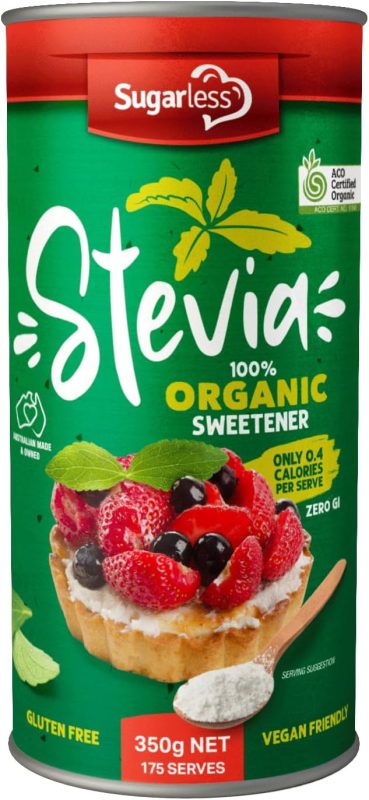
Stevia is a natural sweetener extracted from the leaves of the Stevia rebaudiana plant, native to South America.
Zero calories, zero glycemic index (GI), meaning it doesn’t spike blood sugar—ideal for diabetics or those watching carbs. It’s intensely sweet (200-300 times sweeter than sugar), so you need very little.
Research suggests that swapping sugar for stevia may help prevent weight gain and lower blood sugar levels. While generally considered safe, some studies indicate it could impact gut health, though more research is needed to confirm these effects.
- Pros: Plant-based, no artificial chemicals, and studies (like those from the Journal of Functional Foods) suggest it may even have antioxidant properties.
- Cons: Some find it has a bitter aftertaste, especially in high doses.
Get it on Amazon: https://amzn.to/3Xdgf0a
2. Monk Fruit (Luo Han Guo)
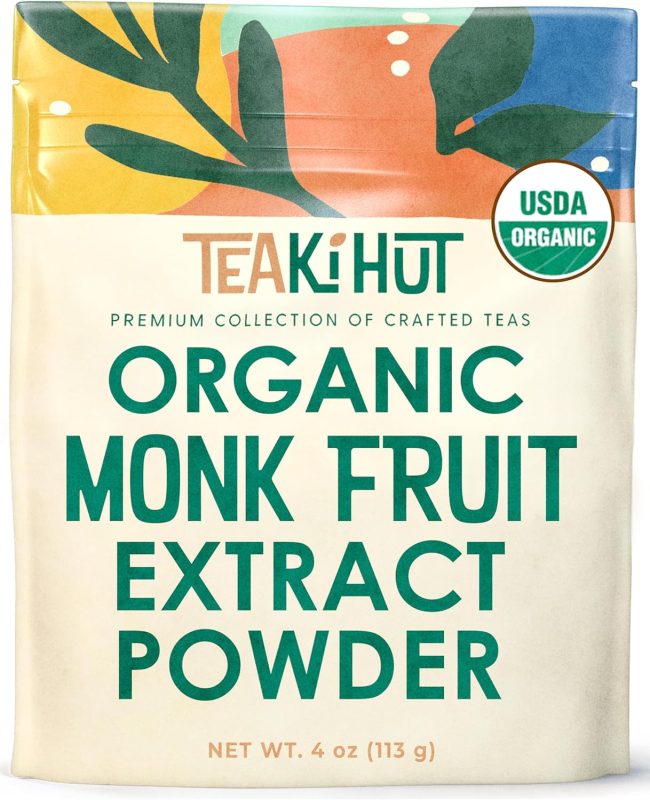
Monk fruit extract comes from the Siraitia grosvenorii plant, native to China.
Despite being about 300 times sweeter than table sugar, it contains zero calories. Its intense sweetness comes from natural compounds called mogrosides, primarily mogroside V.
Since monk fruit extract has no calories and doesn’t impact blood sugar levels, it may support weight loss and help regulate blood sugar when used as a sugar substitute. However, research on its effects in humans is still limited.
When choosing monk fruit sweeteners, check the label carefully—many products contain added sweeteners or fillers.
- Pros: No bitter aftertaste for most, potential anti-inflammatory benefits, natural origin.
- Cons: Expensive, less available, often mixed with fillers like erythritol in stores.
Get it on Amazon: https://amzn.to/4b81n97
3. Sugar alcohols (Erythritol)
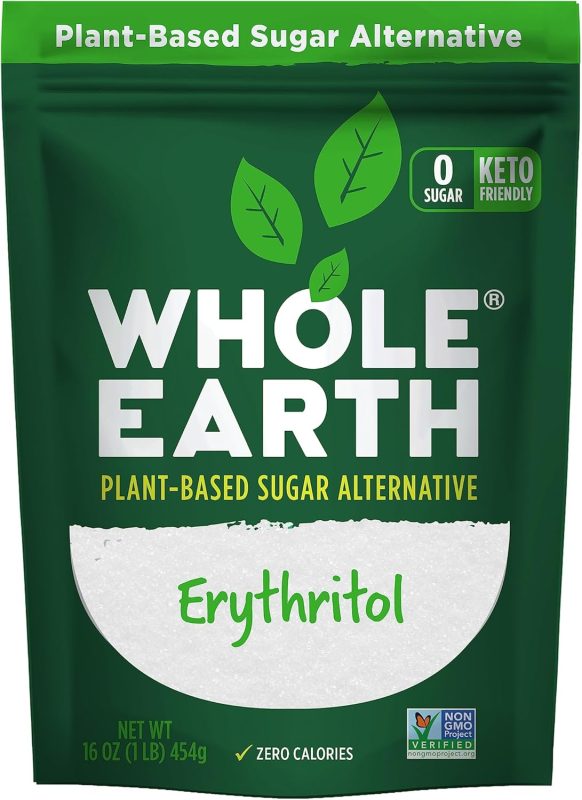
Sugar alcohols, or polyols, are a type of carbohydrate naturally found in fruits and vegetables. They’re commonly used as sugar alternatives, with popular options including erythritol, xylitol, and maltitol.
Unlike regular sugar, sugar alcohols aren’t fermented by bacteria in your mouth, meaning they won’t contribute to tooth decay. They also contain fewer calories and have a minimal impact on blood sugar levels, making them a great choice for people with diabetes.
For comparison:
- Erythritol has just 0.2 calories per gram.
- Xylitol contains 2.4 calories per gram.
- Table sugar (sucrose) has 4 calories per gram.
While sugar alcohols are generally safe, consuming them in large amounts may cause digestive discomfort. For instance, sorbitol can have a laxative effect in doses of 20–50 grams, and excessive erythritol intake may lead to stomach upset.
Additionally, xylitol is extremely toxic to dogs. If you have pets, be sure to keep xylitol out of their reach or consider avoiding it altogether.
- Pros: 70% sugar sweetness, tooth-friendly, minimal digestive issues.
- Cons: Cooling sensation on the tongue; large amounts may cause mild bloating in sensitive people.
Get it on Amazon: https://amzn.to/433trbx
4. Allulose
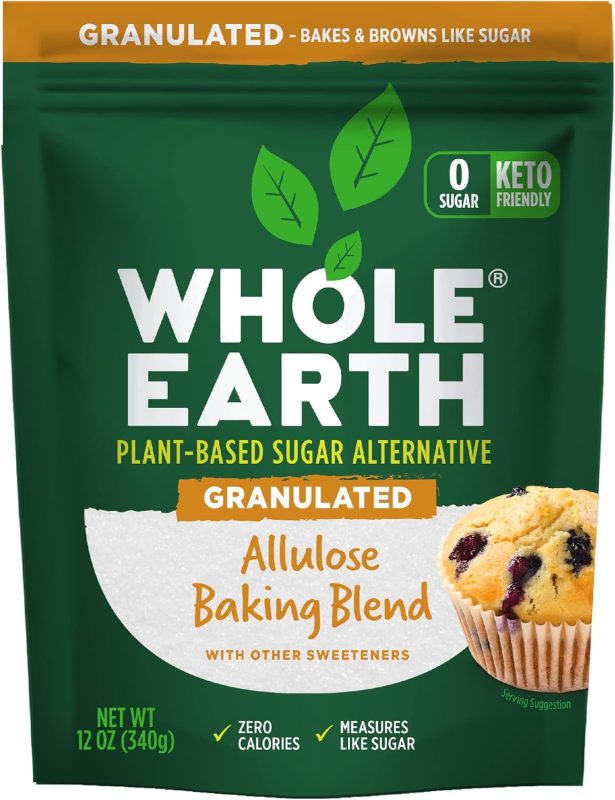
Allulose, also known as D-allulose, is a naturally occurring monosaccharide found in certain fruits.
With about 70% of the sweetness of table sugar, it contains just 0.2 calories per gram, making it a low-calorie alternative. Unlike many other sugar substitutes, allulose closely mimics the taste of regular sugar, making it a popular choice for those looking to cut back on sugar without sacrificing flavor.
Early research suggests that allulose may help lower blood sugar and insulin levels in both diabetic and non-diabetic individuals, though more studies are needed to confirm these effects.
However, consuming large amounts may cause digestive issues such as bloating, diarrhea, and abdominal pain. To avoid discomfort, it’s best to stick to a single dose of no more than 0.19 grams per pound (0.4 grams per kg) of body weight and a daily maximum of 0.4 grams per pound (0.9 grams per kg).
- Pros: Closest to sugar for baking, subtle sweetness (70%), may improve insulin sensitivity.
- Cons: Costly, less common, long-term effects not fully studied.
Get it on Amazon: https://amzn.to/4kcAPHJ
5. Dates
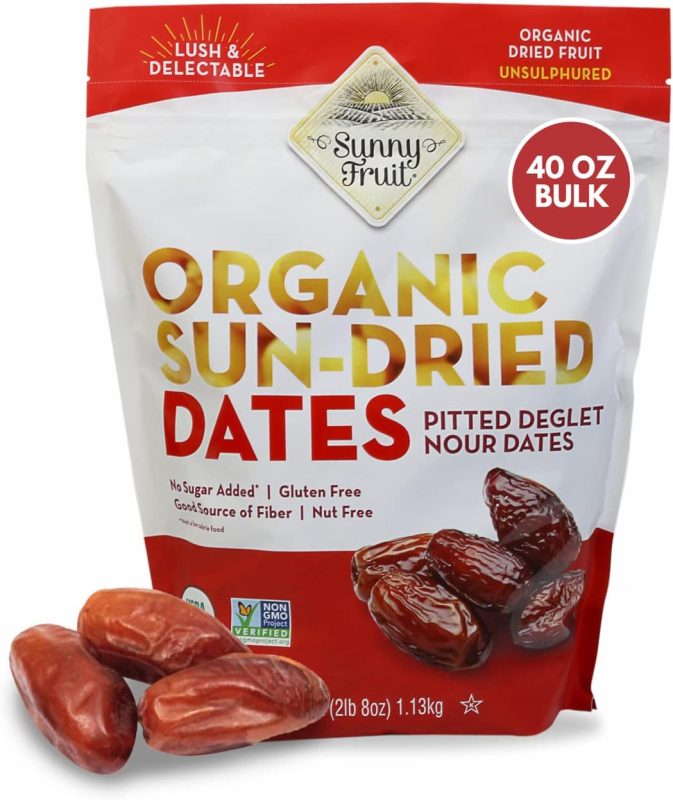
Dates are the dried fruits of the date palm tree and make a naturally sweet, nutrient-rich alternative to refined sugar.
Unlike processed sweeteners, dates are packed with fiber, potassium, magnesium, manganese, vitamin B6, and powerful antioxidants like carotenoids and polyphenols.
Their naturally sweet taste makes them a great substitute for sugar in energy bars, cakes, and cookies. You can also blend them into smoothies or homemade nut milks for added sweetness. Some people even make a thick date paste, which works as a 1-to-1 replacement for refined sugar.
While dates are high in natural sugars and calories, research suggests they don’t spike blood sugar levels as dramatically as table sugar. In a 16-week study of people with type 2 diabetes, those who ate three dates daily saw significant reductions in total and LDL (bad) cholesterol, while their long-term blood sugar levels remained stable.
- Pros: Nutrient-dense, natural, adds a rich, fruity flavor.
- Cons: Doesn’t dissolve (grainy texture), caloric (~3 kcal/g), not great for drinks.
Get it on Amazon: https://amzn.to/3QtWNZ7
6. Coconut Sugar
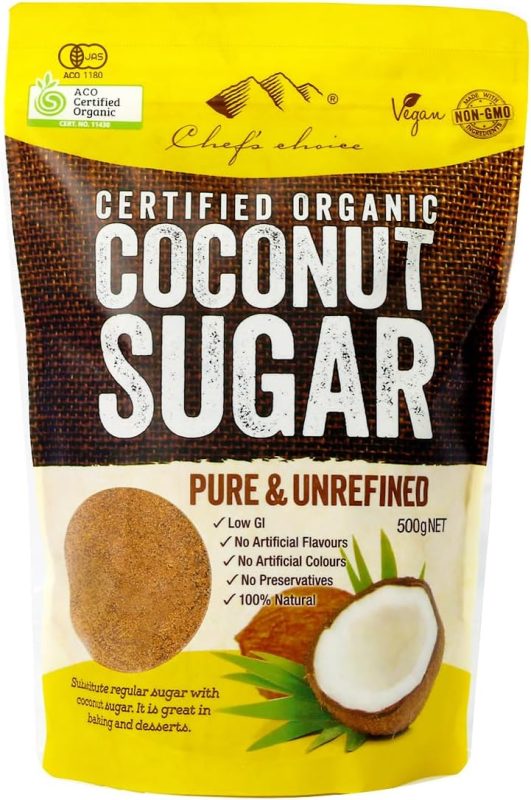
Coconut sugar is a natural sweetener derived from the sap of the coconut palm tree (Cocos nucifera), specifically from the flower buds. The process involves cutting the buds to collect the sap, which is then heated to evaporate the water content, leaving behind a crystallized or granulated form of sugar. Unlike white sugar, which is heavily refined from sugarcane or beets, coconut sugar undergoes minimal processing, retaining some of its natural components.
Coconut sugar, compared to white sugar, has a lower GI (35-54 vs. 65) for slower blood sugar rises, contains trace minerals and antioxidants, and is minimally processed from coconut palm sap. It’s sustainable and offers a caramel-like flavor. Though caloric (~4 kcal/g), it’s a natural, eco-friendly sweetener with mild health benefits.
- Pros: Natural, sustainable, caramel-like flavor enhances recipes.
- Cons: Caloric like sugar (~4 kcal/g), still impacts blood sugar, not ideal for low-carb diets.
Get it on Amazon: https://amzn.to/4k5wu9f
7. Yacon syrup
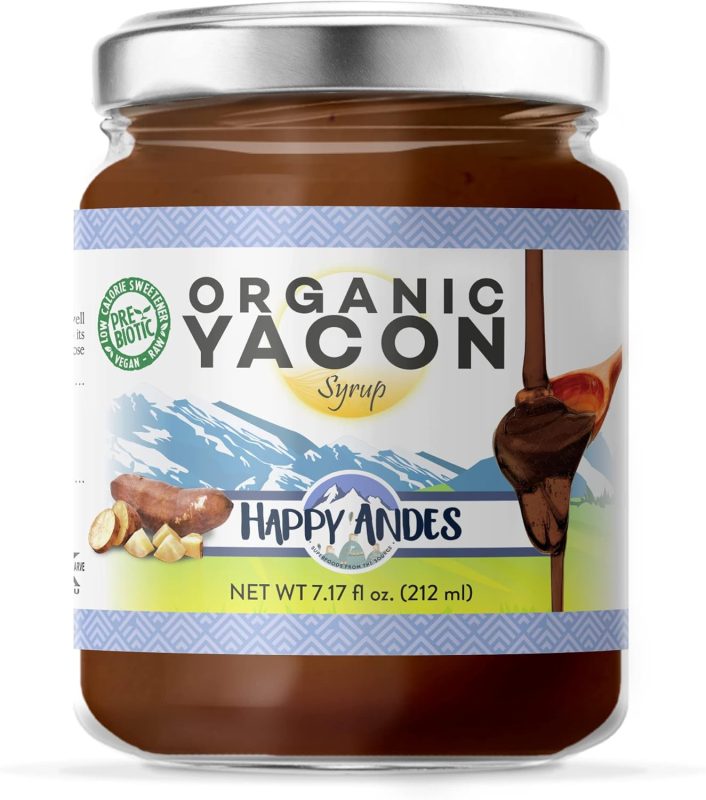
Yacon syrup is derived from the Smallanthus sonchifolius plant, native to South America. With its sweet taste, dark color, and thick consistency, it resembles molasses.
Rich in fructooligosaccharides—sugar molecules your body cannot digest—yacon syrup has only about one-third the calories of regular sugar, or roughly 1.3 calories per gram. However, it’s less sweet than table sugar, so you may need to use more to achieve the same level of sweetness.
Fructooligosaccharides in yacon syrup offer potential health benefits, such as acting as prebiotics that nourish the beneficial bacteria in your gut. Some studies also suggest it may help increase feelings of fullness.
However, research on yacon syrup is still limited, and consuming more than 20 grams per day may cause digestive issues like gas, diarrhea, and stomach pain.
- Pros: Low GI, prebiotic, natural, tasty molasses flavor.
- Cons: Digestive issues, some calories (~20 cal/tbsp), less sweet, pricey.
Get it on Amazon: https://amzn.to/4i0aKKo
8. Honey
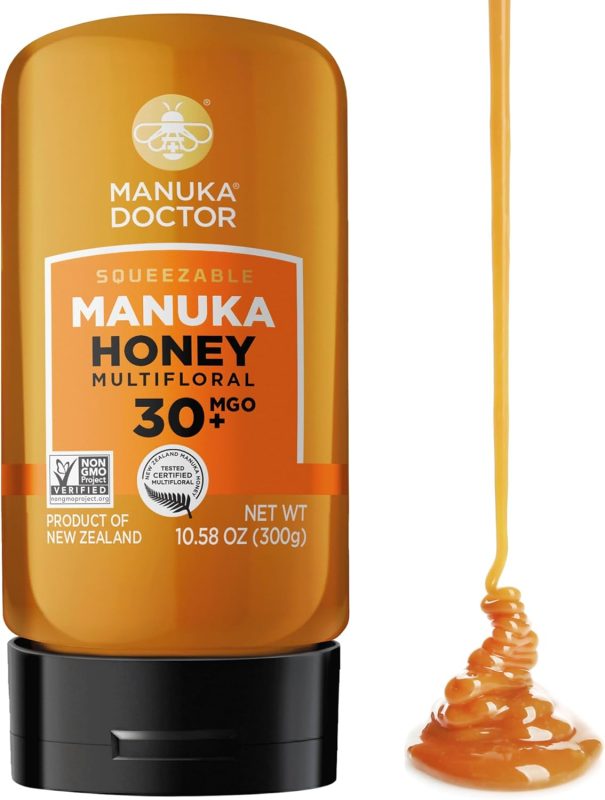
Honey is a thick, golden liquid created by honeybees, packed with trace amounts of vitamins and minerals, as well as plant compounds that offer anti-inflammatory and antioxidant benefits.
The specific types of plant compounds in honey vary depending on factors like the type of bee and the flowers it feeds on. Honey polyphenols, for example, may help reduce inflammation in the body.
Honey also has a slightly lower glycemic index (GI) than table sugar, making it a potentially healthier option. However, while these qualities suggest honey could be better than refined sugar, the research on its health benefits is still limited.
If you choose honey as a sweetener, it’s best to use it in moderation, as it remains high in sugar and calories.
- Pros: Rich, complex flavor, potential antimicrobial properties, versatile in cooking.
- Cons: High calories (3 kcal/g), GI (50-60), not suitable for vegans or infants (botulism risk).
Get it on Amazon: https://amzn.to/4bd2IeJ
9. Maple syrup
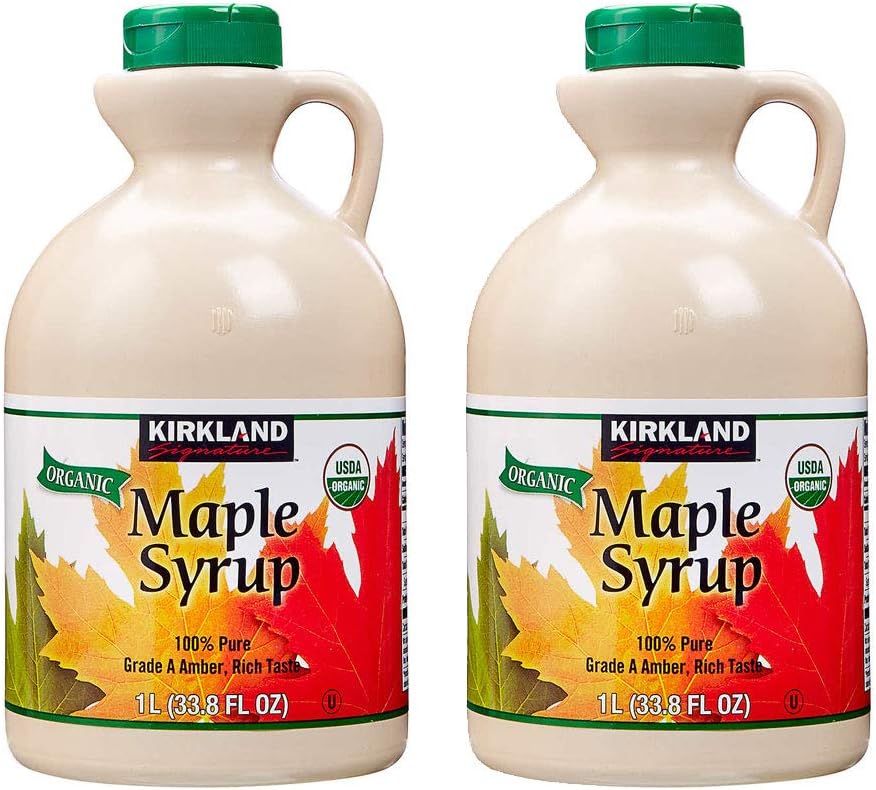
Maple syrup is a thick, sugary liquid made by boiling the sap of maple trees.
It contains small amounts of minerals such as calcium, potassium, iron, zinc, and manganese, and is rich in phenolic compounds like lignans and coumarins, which may offer anti-inflammatory and antioxidant benefits.
While maple syrup does provide some nutrients and antioxidants, it remains very high in sugar. It has a slightly lower glycemic index (GI) than regular sugar, but like any sweetener, it’s best to use it in moderation.
- Pros: Distinct flavor, works in baking and toppings, minimally processed if pure.
- Cons: Caloric (~2.6 kcal/g), expensive, still raises blood sugar.
Get it on Amazon: https://amzn.to/4bcIQsn
10. Molasses
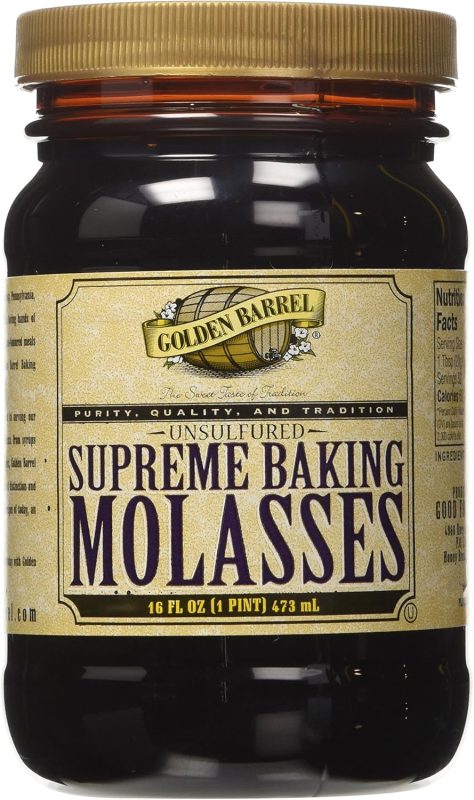
Molasses is a thick, syrup-like sweetener made by boiling sugar cane or sugar beet juice.
It’s packed with vitamins, minerals, and antioxidants, and is particularly rich in iron, potassium, and calcium—minerals that are crucial for various aspects of health.
While molasses can be a great alternative to refined sugar due to its nutritional content, it’s still a sugar, so it’s best to use it in moderation.
- Pros: Nutrient-rich (iron, calcium), natural, bold flavor enhances baking.
- Cons: High calories (60 cal/tbsp), high GI (55-70), sticky texture.
Get it on Amazon: https://amzn.to/41qBPke
